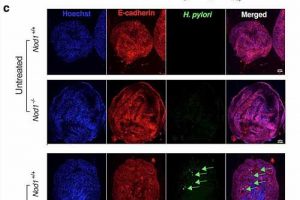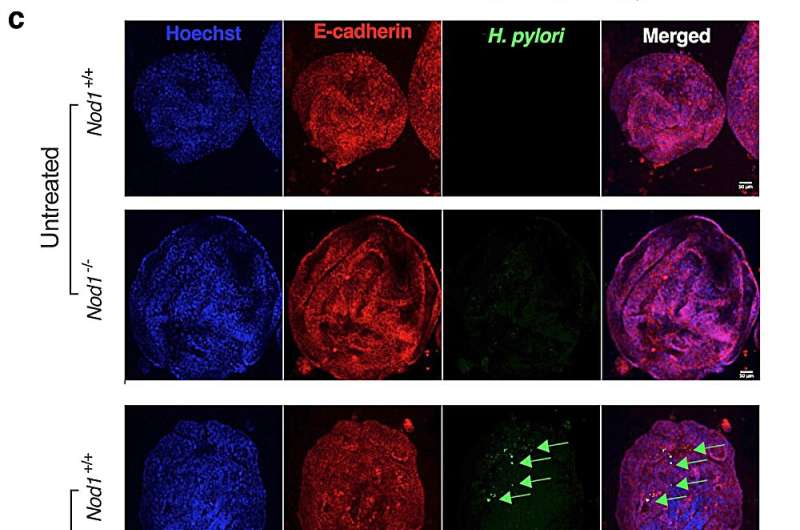Researchers study the link between the bacteria H. pylori and stomach cancer


H. pylori—short for Helicobacter pylori—colonizes the stomach and is known to be linked to the development of stomach cancer. It is estimated that over half of the world’s population is infected with H. pylori, making it one of the most common bacterial infections.
While there is a great deal still to understand about the link between the bacterium H. pylori and the development of stomach cancer, Hudson Institute is at the forefront of research into studying this link and how it may be possible to prevent the infection.
Research from the group of Professor Richard Ferrero, Head of Hudson Institute’s Gastrointestinal Infection and Inflammation Research Group, has looked at the activity of cytokines, which are small signaling proteins that are crucial in regulating a range of functions in the body.
“We showed that a particular cytokine (IL-18), which was previously thought to promote inflammation in H. pylori infection, seems instead to play a protective role in reducing tissue damage and maintaining homeostasis,” Ferrero said. The research has been published in the journal Nature Communications.
This finding could have significant impact on treatments and prevention for diseases of the stomach lining such as gastritis, but also for stomach cancer which is known to be linked to H. pylori infection.
“In a pre-clinical model, our team found that the conversion of IL-18 into its active form is important in reducing tissue damage,” said Ferrero
“We now need to determine whether it is also important in preventing the severe effects of H. pylori infection in humans.”
Ferrero’s group is also aiming to develop a vaccine against H. pylori infection, which would have a huge impact on the incidence of stomach cancer worldwide.
H. pylori: What you need to know
H. pylori is typically contracted during childhood and can remain in the body for years, causing inflammation of the stomach lining (gastritis), but without causing any symptoms. In some cases, it can lead to peptic ulcers affecting the stomach or the duodenum, the first section of the small intestine. However, the most concerning consequence of an H. pylori infection is the increased risk of developing stomach cancer.
Studies have shown that individuals infected with H. pylori are up to six times more likely to develop stomach cancer compared to those without the infection. This is because H. pylori causes chronic inflammation in the stomach, which can lead to changes in the cells lining the stomach and increase the risk of cancer. One of the ways that this occurs is through H. pylori induction of a cytokine, IL-1b, which promotes inflammation and suppresses acid production in the stomach.
Stomach bacteria and cancer facts:
- Stomach cancer is the fifth most common cancer worldwide. In some parts of Asia, it is the second most common form of cancer.
- It is estimated that more than 1 million people are diagnosed with stomach cancer each year, and it is responsible for more than 700,000 deaths annually.
- While the exact cause of stomach cancer is not fully understood, H. pylori infection is one of the major factors for the development of this type of cancer.
- Early detection and treatment of stomach cancer can significantly improve the chances of survival. Unfortunately, stomach cancer is often diagnosed in its later stages when it is more difficult to treat.
- Most cases of H. pylori infection do not lead to serious disease. However, it is important to be aware of any symptoms and risk factors, e.g., family history, smoking, high salt diet.
More information:
L. S. Tran et al, NOD1 mediates interleukin-18 processing in epithelial cells responding to Helicobacter pylori infection in mice, Nature Communications (2023). DOI: 10.1038/s41467-023-39487-1
Journal information:
Nature Communications
Source: Read Full Article